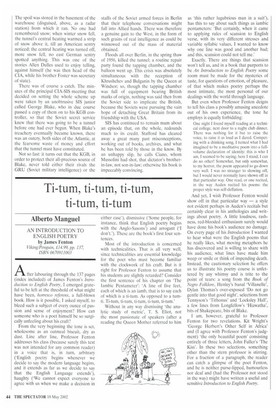Ti-turn, ti-turn, ti-turn, ti-turn, ti-turn
Alberto Manguel
AN INTRODUCTION TO ENGLISH POETRY by James Fenton Viking/Penguin, £14.99, pp. 137, ISBN 0670911003 After labouring through the 137 pages (index included) of James Fenton's Introduction to English Poetry, I emerged grateful to be left at the threshold of what might have been, horresco referens, a full-blown book. How is it possible, I asked myself, to bleed such a subject of every ounce of passion and sense of enjoyment? How can someone who is a poet himself be so surgically unfeeling about his craft?
From the very beginning the tone is set, wholesome as an oatmeal biscuit, dry as dust. Line after line, Professor Fenton addresses his class (because surely this text was not intended for any common reader) in a voice that is, in turn, arbitrary (English poetry begins whenever we decide to say the modern language begins, and it extends as far as we decide to say that the English Language extends'), haughty ('We cannot expect everyone to agree with us when we make a decision in either case'), dismissive ('Some people, for instance, think that English poetry begins with the Anglo-Saxons') and arrogant CI don't.'). These are the book's first four sentences.
Most of the introduction is concerned with technicalities. That is all very well, since technicalities are essential knowledge for the poet who must become familiar with the clockwork of his craft. But is it right for Professor Fenton to assume that his students are slightly retarded? Consider the first sentence of his chapter on 'The Iambic Pentameter': 'A line of five feet, each of which is an iamb, that is to say each of which is a 6-turn, As opposed to a turnti. Ti-turn, 6-turn, ti-turn, ti-tum, ti-turn.'
Without in any way dismissing 'the analytic study of metric', T. S. Eliot, not the most passionate of speakers (after a reading the Queen Mother referred to him














































































 Previous page
Previous page